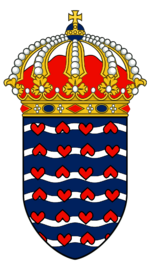Far Dig Val
"Far Dig Val" is an Emerstarian song by Karl IV Lorens in 1704. It was set to music by Frederik Johann Kjellstrom by request of Ervin III Karl in 1715.
Background
The song was written by Karl IV Lorens on the eve of his death on 1 November 1704 in case he should die as a goodbye to the Emerstarian people. When his body was returned to Emerstari, the song was sung at his funeral, and in 1715 it was set to music.
Karl IV Lorens's nephew and King of Emerstari in 1716, Ervin III Karl, requested that the song be sung at his funeral as well, and began the song's tradition of being sung at royal funerals.
Lyrics
"Far dig val, minje furst elskling,
Fur, i tid, vi skal har vår återförening,
Ske skal at værer,
Aven skal tar at tusentels år.
Dokke, glømmar mig ikke,
Åg, mereså, glømmar ikke mina månne,
Mina lojella månne hvemme offras sig fur oss,
Glømmar ikke dem, fur de byggadt uppå oss.
Far dig val, minje furst elskling,
Fur, i tid, vi skal har vår återförening,
Ske skal at værer,
Aven skal tar at tusentels år.
Langre, eftergiver mig, jeg ber,
Åg, mereså, eftergiver mig fiender,
Mina fiender hvemme har mig dråpein,
Eftergiver dem, fur være de medman.
Far dig val, minje furst elskling,
Fur, i tid, vi skal har vår återförening,
Ske skal at værer,
Aven skal tar at tusentels år."
Translated lyrics
"Fare thee well, my foremost love,
For, in time, we will have our reunification,
So will that happen,
Even if it takes a thousand years.
However, do not forget me,
And moreover, do not forget my men,
My loyal men who sacrificed themselves for us,
Do not forget them, for they built upon us.
Fare thee well, my foremost love,
For, in time, we will have our reunification,
So will that happen,
Even if it takes a thousand years.
Further, forgive me, I pray,
And moreover, forgive my enemies,
My enemies who have had me slain,
Forgive them, for they are peers.
Fare thee well, my foremost love,
For, in time, we will have our reunification,
So will that happen,
Even if it takes a thousand years."

